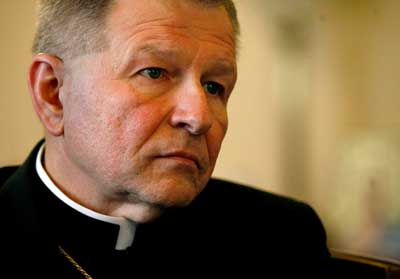
(RNS1-MARCH4) Archbishop Gregory Aymond of New Orleans has ordered a Catholic high school to stop its policy of corporal punishment for wayward students. For use with RNS-SCHOOL-PADDLE, transmitted March 4, 2011. Religion News Service photo by John McCusker/The Times-Picayune.
NEW ORLEANS (RNS) As a high-school student in the mid-1960s, Greg Aymond occasionally saw an angry teacher cuff a student. It never happened to him, nor does the memory of faculty discipline in those days particularly trouble the man who later became the archbishop of New Orleans.
But now, as Archbishop Gregory Aymond confronts formal physical punishment at one of the city’s top Catholic high schools jewels, he is clear:
“I do not believe the teachings of the Catholic Church as we interpret them in 2011 condone corporal punishment.
“It’s hard for me to imagine in any way, shape or form, Jesus using a paddle,” he said.
Moreover, Aymond said, the social research “is very, very clear: Violence fosters violence.”
The 61-year-old archbishop’s concerns about corporal punishment at St. Augustine High School received a public airing late last month (Feb.) in an extraordinary meeting with the school’s parents and alumni.
The alumni urged the school to drop its temporary ban on paddling — a ban put in place, Aymond disclosed, as a result of concerns he quietly raised months ago.
One after another, business and professional men, tradesmen and fathers recalled getting bent over and whacked by a lay teacher or a priest during their days at St. Augustine.
With the distance of age, they told Aymond they appreciated the crack of the paddle for its ability to force a mid-course correction on a young man grown lazy, or disrespectful, or too full of himself.
A few recalled memorable collective punishment: a whole class getting caned, one by one, for substandard academic performance, or because one miscreant declined to come forward.
“I listened, genuinely,” Aymond said. “The words I heard are that we are different. We are unique. It works for us. It’s not a problem. This is the best way we can do discipline.”
Still, Aymond said after the meeting, physical punishment is banned in all Catholic schools for reasons both theological and psychological. “It saddens me that any school in the archdiocese uses corporal punishment,” the archbishop said.
Aymond said the concern about corporal punishment at St. Augustine dates back two years, and the concern is his — not a parent’s, nor a lawyer’s.
“I’m not concerned primarily about liability,” he said. “I am concerned about morality.
“In my mind, to strike another person in this day and age — 40, 50, 60 years ago, it might have been OK — but in this day and age, all the data says this is not an appropriate thing to do.
“It doesn’t foster a positive self-image. I don’t think it’s what the Catholic Church should be doing. And it’s not what Jesus would do.”
The archbishop said he found the matter waiting for him when he arrived in New Orleans from Austin in the late summer of 2009.
Aymond said his early official readings contained an unusual letter forwarded to New Orleans by the national bishops’ Office of Child and Youth Protection, the abuse-prevention department set up in the wake of the Catholic sex abuse scandal.
Aymond said the letter came from an activist (whom he did not identify) who wrote from Ireland, which is suffering through a sexual abuse scandal in the Catholic Church worse than the American experience in 2002.
Aymond said the Irish author singled out the continuing existence of physical punishment at St. Augustine in New Orleans and called it to the bishops’ attention.
Aymond said he inquired and learned that despite archdiocesan prohibition, corporal punishment was and is expressly authorized in St. Augustine’s handbook, administered with a piece of wood at the front of a class.
He said he learned that the archdiocese occasionally received parental complaints, which were forwarded to St. Augustine for handling.
Troy Henry, who chairs the board that runs day-to-day operations at the school, said he was surprised to hear the archbishop had received parental complaints. Henry said he had spoken to school officials, who maintain they have not heard any.
Aymond said in late 2009 the archdiocese hired Monica Applewhite, a national consultant on “safe environments” for minors, to review the environment at St. Augustine in conversations with administrators, teachers, parents and students.
Although he declined to discuss her report, he said it was her research underlying his statement that St. Augustine is the last Catholic school in the country to use the wooden paddle.
Aymond said his conversations with the Josephites, the order of Catholic priests that runs St. Augustine, prompted them to call a temporary ban on corporal punishment.
(Bruce Nolan writes for The Times-Picayune in New Orleans.)




